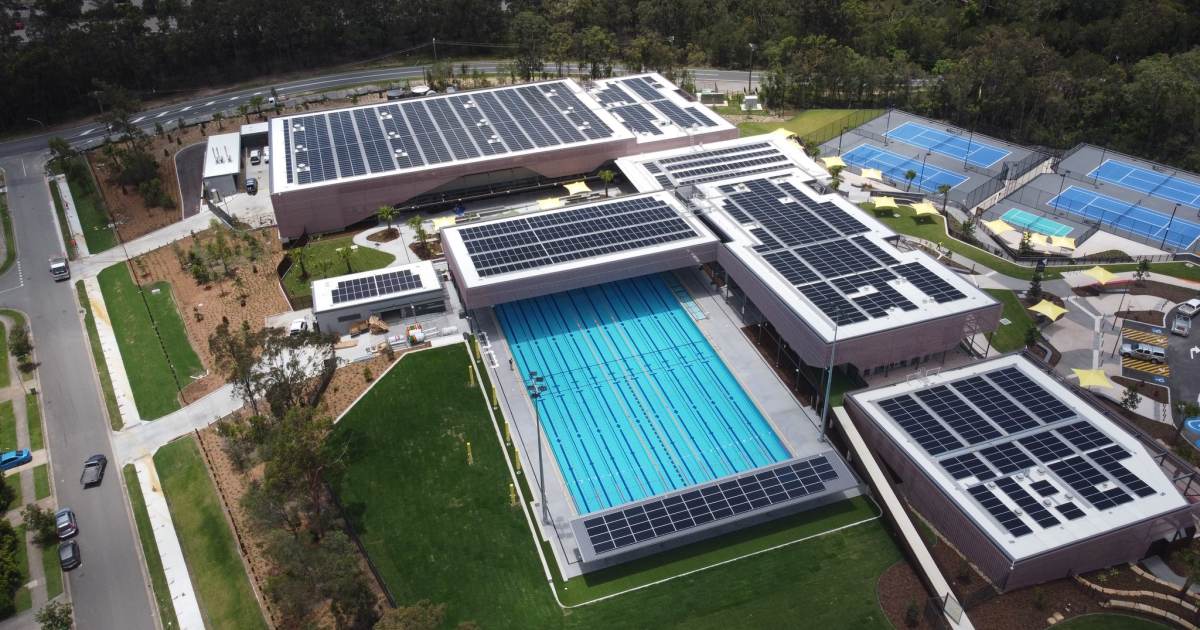
Close to two thousand solar panels and a battery system are helping to power the newly opened Pimpama Sports Hub on Queensland’s Gold Coast.
City of Gold Coast’s $94 million Pimpama Sports Hub officially opened its doors on Friday. Occupying 14 hectares, the integrated aquatic, sporting and community precinct in the Gold Coast’s north is the City’s largest civic infrastructure project to date.
Among its many facilities:
- Aquatic centre with five pools
- Community centre with main hall, meetings rooms and dance studio
- 12 netball courts
- Eight tennis courts and one junior hot shot court
- Café, seating and barbecue facilities
- Fitness centre
- Events park including an amphitheatre
- Parklands and shaded playground
“This facility will be remembered as one of the best investments we have ever made in the northern Gold Coast,” said Mayor Tom Tate. “It’s simply outstanding and will put smiles on thousands of faces every year.”
Council expects the facility to attract up to 800,000 visitors in its first year of operation. It’s been quite an achievement given the idea for the Hub was first raised at a meeting in 2015.
Gas Cogeneration, Solar And Battery Power
Operating such a huge facility is accompanied by major electricity consumption, but power costs will be reduced through the facility’s solar energy and battery storage features.
1,924 panels have been installed across Pimpama Sports Hub rooftops for a total 910 kW capacity that will generate equivalent to 50 per cent of the electricity required for the site. According to Council, the Hub also has a 316kWh battery system that I’ve also seen reported as being “444 kilowatts”.
Additionally, a gas-fired cogeneration system at the Hub generates both electricity and thermal energy to heat the pools.
Energy Independence
Pimpama Sports Hub’s on-site energy system has been designed to continue to supply power in the event of a mains grid outage. It’s also operating as part of the City’s Virtual Power Plant (VPP), which consists of more than 47 city buildings.
Approximately 3.3MW of solar PV capacity has been installed by Council to date (it’s not clear if this includes the Hub), which Council says is saving ratepayers around $400,000 a year in energy costs.
Electric Vehicle Charging
Pimpama Sports Hub also hosts six electric vehicle chargers – 75kW Tritium RTM75 fast-charging stations. These chargers support CHAdeMO (Nissan) and CCS2 (Tesla/Mercedes/BMW/Volvo/Hyundai/Kia/Renault) connections.
The Hub’s EV charging facility is part a network of 10 fast-charging stations installed across the Gold Coast; all of which are offset by solar power generation.
Pimpama A PV Powerhouse
In Pimpama, solar panels are a common sight; with more than 9,411 small-scale (<100kW) systems installed across the 4209 postcode as at the end of October this year. Given a population of close to 47,000, the collective capacity of 56,174 kW works out to around 1.2kW of solar capacity per person.
Across the City of Gold Coast, approximately 90,218 solar installations (all capacities) had occurred up to the end of September according to the Australian PV Institute. APVI estimates approximately 41.8% of freestanding and semi-detached dwellings in the local government area have had systems installed.

 RSS - Posts
RSS - Posts



Speak Your Mind